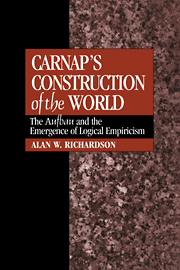Book contents
- Frontmatter
- Contents
- Acknowledgments
- Introduction
- 1 Reconstructing the Aufbau
- 2 The problem of objectivity: An overview of Carnap's constitutional project
- 3 An outline of the constitutional projects for objectivity
- 4 The background to early Carnap: Themes from Kant
- 5 The fundamentals of neo-Kantian epistemology
- 6 Carnap's neo-Kantian origins: Der Raum
- 7 Critical conventionalism
- 8 Epistemology between logic and science: The essential tension
- 9 After objectivity: Logical empiricism as philosophy of science
- Bibliography
- Index
8 - Epistemology between logic and science: The essential tension
Published online by Cambridge University Press: 30 October 2009
- Frontmatter
- Contents
- Acknowledgments
- Introduction
- 1 Reconstructing the Aufbau
- 2 The problem of objectivity: An overview of Carnap's constitutional project
- 3 An outline of the constitutional projects for objectivity
- 4 The background to early Carnap: Themes from Kant
- 5 The fundamentals of neo-Kantian epistemology
- 6 Carnap's neo-Kantian origins: Der Raum
- 7 Critical conventionalism
- 8 Epistemology between logic and science: The essential tension
- 9 After objectivity: Logical empiricism as philosophy of science
- Bibliography
- Index
Summary
the look back at neo-Kantian epistemology and Carnap's own work in the 1920s leading to Der logische Aufbau der Welt has served to highlight important themes that we shall examine in this chapter in relation to the 1928 book itself. First, the point of view of the epistemological project of the Aufbau is in some respects closer to, for example, Ernst Cassirer's general epistemology in Substance and Function than to Carnap's own conventionalist methodology of science. Three aspects of the Aufbau are particularly noteworthy in this regard: First, the stress on the epistemological centrality of objectivity is more pronounced than it was in Carnap's methodological work; second, the role of logic is much greater here than it had been previously in Carnap's work; third, simply as a general epistemology, the Aufbau has the broad scope of Cassirer's logic of objective knowledge, rather than the more narrow scope of Carnap's work on physics. These connections, of course, give rise ultimately to great divergences between the project of the Aufbau and Cassirer's logical idealism. The principal reason for this is that Carnap's formal logic allows him to present a technical project that Cassirer had never attempted. This technical project no longer allows the expression of Carnap's earlier rejection of strict empiricism. But this does not mean that he now endorses strict empiricism; it means, rather, that he can no longer distinguish the genuinely epistemological aspects of the project of empiricism from the epistemological aspects of neo-Kantianism.
Beyond this, however, we now have all the pieces we need to understand the circumstance that has driven our curiosity.
- Type
- Chapter
- Information
- Carnap's Construction of the WorldThe Aufbau and the Emergence of Logical Empiricism, pp. 183 - 206Publisher: Cambridge University PressPrint publication year: 1997



